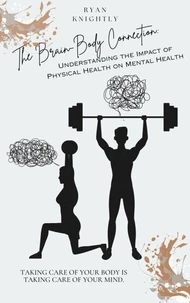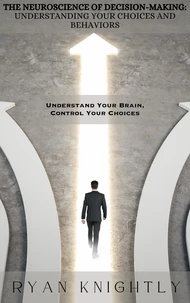The Neuroscience of Addiction: Understanding the Brain's Reward System
Par :Formats :
Disponible dans votre compte client Decitre ou Furet du Nord dès validation de votre commande. Le format ePub est :
- Compatible avec une lecture sur My Vivlio (smartphone, tablette, ordinateur)
- Compatible avec une lecture sur liseuses Vivlio
- Pour les liseuses autres que Vivlio, vous devez utiliser le logiciel Adobe Digital Edition. Non compatible avec la lecture sur les liseuses Kindle, Remarkable et Sony
 , qui est-ce ?
, qui est-ce ?Notre partenaire de plateforme de lecture numérique où vous retrouverez l'ensemble de vos ebooks gratuitement
Pour en savoir plus sur nos ebooks, consultez notre aide en ligne ici
- FormatePub
- ISBN8223056645
- EAN9798223056645
- Date de parution18/06/2023
- Protection num.pas de protection
- Infos supplémentairesepub
- ÉditeurDraft2Digital
Résumé
The Neuroscience of Addiction: Understanding the Brain's Reward System, written by Ryan Knightly, is a comprehensive guide that explores the complex relationship between addiction and the brain's reward system. This book is a must-read for anyone looking to gain a deeper understanding of addiction and how it affects the brain. Through 20 informative chapters, Knightly delves into the intricate workings of the brain, including neurotransmitters, genetics, and the mesolimbic pathway.
He also discusses the impact of addiction on the prefrontal cortex, the limbic system, and neuroplasticity. Additionally, the book explores both behavioral and substance addictions, including the cycle of addiction and withdrawal symptoms. The book also provides insights into effective addiction treatment methods such as neurofeedback, cognitive behavioral therapy, and medication-assisted treatment.
Knightly addresses the role of trauma in addiction and the importance of addressing it as part of the recovery process. The book concludes with a discussion on the future of addiction treatment and the need to address addiction as a public health issue. The Neuroscience of Addiction is a valuable resource for anyone interested in learning about the underlying mechanisms of addiction and the latest advances in addiction treatment.
Knightly's writing style is accessible, and his thorough explanations make the complex topics easy to understand. This book is a must-read for anyone looking to gain a deeper understanding of addiction and the brain's reward system.
He also discusses the impact of addiction on the prefrontal cortex, the limbic system, and neuroplasticity. Additionally, the book explores both behavioral and substance addictions, including the cycle of addiction and withdrawal symptoms. The book also provides insights into effective addiction treatment methods such as neurofeedback, cognitive behavioral therapy, and medication-assisted treatment.
Knightly addresses the role of trauma in addiction and the importance of addressing it as part of the recovery process. The book concludes with a discussion on the future of addiction treatment and the need to address addiction as a public health issue. The Neuroscience of Addiction is a valuable resource for anyone interested in learning about the underlying mechanisms of addiction and the latest advances in addiction treatment.
Knightly's writing style is accessible, and his thorough explanations make the complex topics easy to understand. This book is a must-read for anyone looking to gain a deeper understanding of addiction and the brain's reward system.
The Neuroscience of Addiction: Understanding the Brain's Reward System, written by Ryan Knightly, is a comprehensive guide that explores the complex relationship between addiction and the brain's reward system. This book is a must-read for anyone looking to gain a deeper understanding of addiction and how it affects the brain. Through 20 informative chapters, Knightly delves into the intricate workings of the brain, including neurotransmitters, genetics, and the mesolimbic pathway.
He also discusses the impact of addiction on the prefrontal cortex, the limbic system, and neuroplasticity. Additionally, the book explores both behavioral and substance addictions, including the cycle of addiction and withdrawal symptoms. The book also provides insights into effective addiction treatment methods such as neurofeedback, cognitive behavioral therapy, and medication-assisted treatment.
Knightly addresses the role of trauma in addiction and the importance of addressing it as part of the recovery process. The book concludes with a discussion on the future of addiction treatment and the need to address addiction as a public health issue. The Neuroscience of Addiction is a valuable resource for anyone interested in learning about the underlying mechanisms of addiction and the latest advances in addiction treatment.
Knightly's writing style is accessible, and his thorough explanations make the complex topics easy to understand. This book is a must-read for anyone looking to gain a deeper understanding of addiction and the brain's reward system.
He also discusses the impact of addiction on the prefrontal cortex, the limbic system, and neuroplasticity. Additionally, the book explores both behavioral and substance addictions, including the cycle of addiction and withdrawal symptoms. The book also provides insights into effective addiction treatment methods such as neurofeedback, cognitive behavioral therapy, and medication-assisted treatment.
Knightly addresses the role of trauma in addiction and the importance of addressing it as part of the recovery process. The book concludes with a discussion on the future of addiction treatment and the need to address addiction as a public health issue. The Neuroscience of Addiction is a valuable resource for anyone interested in learning about the underlying mechanisms of addiction and the latest advances in addiction treatment.
Knightly's writing style is accessible, and his thorough explanations make the complex topics easy to understand. This book is a must-read for anyone looking to gain a deeper understanding of addiction and the brain's reward system.























